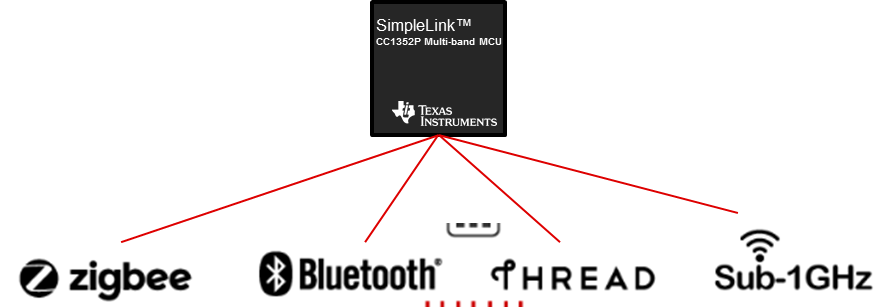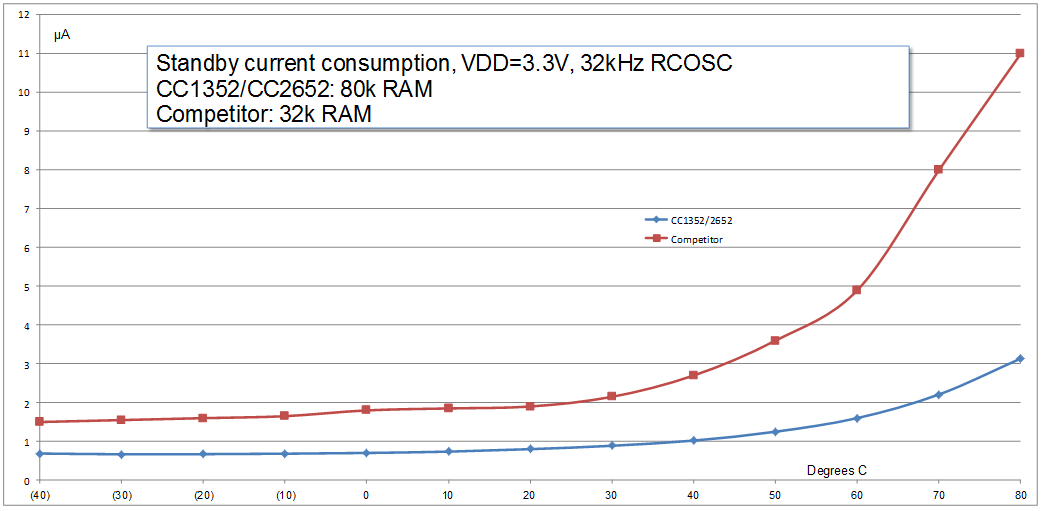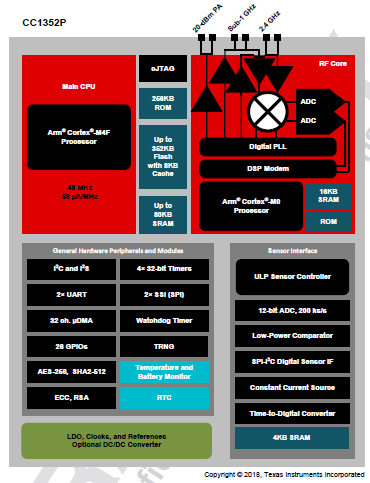SSZT659 july 2018 CC1352P
Last time I was out shopping for the latest connected device for my home, I was faced with dozens of options. Should I get a battery-powered Wi-Fi camera or one that is powered over Ethernet? Should I get a door lock that works with my smart phone or one that connects to my existing security system? If I buy the newest smart light, do I need to buy a special hub so that it will work in my current system? As consumers of connected devices, we are faced with various compromises when selecting the right device for us and our home.
Wireless application designers face the same compromises when choosing between the different devices, standards, technologies and design options available for connected products. You need to ask yourselves questions like: Should the design leverage Wi-Fi®, Bluetooth® 5, Thread, Zigbee or Sub-1 GHz? Can the design leverage a single-chip solution to meet space constraints or does it require multiple devices? How long does the battery life need to be?
Ideally, designers would have it all: a low-power, long-range solution with the flexibility to take advantage of different standards and topologies that also meets space and cost constraints. The reality is that you often have to sacrifice one or two of these criteria to meet the overall design goals.
TI’s SimpleLink™ platform minimizes compromises with the new SimpleLink multiband CC1352P wireless microcontroller (MCU) by offering:
- Long range. One way to extend range in a wireless application is to use a power amplifier to increase the power that the system is transmitting at, which increases the application’s total link budget. The CC1352P offers an integrated +20dBm power amplifier, which allows you to extend the range of your applications. To put it in perspective, each +6dBm increase in link budget doubles the total range of the system under ideal conditions. The CC1352P approximately quadruples the range at 2.4GHz and doubles the range at Sub-1 GHz compared to currently available solutions without an integrated power amplifier. This enables the deployment of sensors in remote locations and decreases the number of gateways/routers in your network.
-
Flexible design. The CC1352P offers multiband operation, meaning that you can take advantage of different wireless protocols using a single radio. This includes the ability to boot into different standards using an over-the-air firmware update or operate two standards simultaneously. Today, the CC1352P supports Sub-1 GHz, Bluetooth low energy, Thread and Zigbee, with the option for simultaneous operation of Sub-1 GHz and Bluetooth low energy and a roadmap for additional simultaneous protocol combinations as shown in Figure 1.
 Figure 1 Flexible Design
with Multiband Operation
Figure 1 Flexible Design
with Multiband Operation -
Low power. The CC1352P offers the industry’s lowest power integrated PA achieving +20dBm output without sacrificing power consumption (Tx = 65mA at Sub-1 GHz, Tx = 79mA at 2.4GHz). Additionally, the CC1352P device’s ultra-low-power sensor controller engine achieves consumption as low as 1µA while taking action based on sensor inputs. The CC1352P has very stable power performance across a range of temperatures. As you can see in Figure 2, all of these factors combine to allow you to meet power-consumption requirements without sacrificing performance.
 Figure 2 CC1352P Power
Performance across a Range of Temperatures
Figure 2 CC1352P Power
Performance across a Range of Temperatures -
Simple design. In addition to the integrated power amplifier, multiband operation with the software-defined radio and ultra-low-power sensor controller engine, the CC1352P offers an Arm® Cortex®-M4F application MCU. The CC1352P is a single-chip solution that can replace four separate devices (power amplifier, Sub-1 GHz radio, 2.4GHz radio and application MCU). This helps simplify the design by integrating multiple functionalities into a single device as shown in Figure 3.
 Figure 3 SimpleLink CC1352P Block
Diagram
Figure 3 SimpleLink CC1352P Block
DiagramConclusion
Additional Resources:
Check out the SimpleLink Academy to learn more.